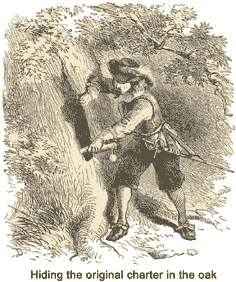James II became apprehensive about the New England colonies' increasingly independent ways; he and other British officials were particularly upset by the open flouting of the Navigation Acts. The continuing military threat posed by the French and their Indian allies in North America was an additional reason to tighten control of the colonies. In 1686, all of New England was joined in an administrative merger, the Dominion of New England; two years later, New York and both New Jerseys were added.
This agency's creation was regarded in Britain as a thoughtful move and not a punitive measure. Unifying the northern colonies for purposes of defense and administrative control was viewed differently in America. The colonists had earlier participated in the New England Confederation.
Joseph Dudley served briefly as the first president of the Dominion, but was replaced by Sir Edmund Andros. An experienced soldier and dedicated public servant, Andros nevertheless lacked the common sense and personal skills to be successful in his new position. He followed his orders assiduously by terminating local assemblies, taxing the colonists without the consent of their representatives, and vigorously attempting to end smuggling through strict enforcement of the Navigation Acts.
Massachusetts was not the only colony in which the Dominion caused a furor. In 1687, Andros was so angered by Connecticut's failure to cooperate with the new regime that he and armed retainers tried to take physical possession of the colony’s charter. According to legend, the Connecticut colonists hid the document within a crevice of an old oak tree.*
 The Dominion experienced little success, due largely to colonial intransigence. New England merchants had long made smuggling a way of life and bitterly resisted changes that might affect their income sources. Andros’ efforts to unify colonial military responses were stillborn because of his failure to provide much in the way of funding and arms. The Dominion came to an abrupt halt in 1689, when word arrived in the colonies about the removal of James II from the throne in the Glorious Revolution.
The failure of the Dominion of New England temporarily changed many British officials' attitudes toward the American colonies. A period of “salutary neglect” prevailed in the late 17th and early 18th centuries. Some in authority believed that there was greater wisdom in attempting to encourage commercial relations with the colonies than in meddling in their governmental affairs. That beneficial disregard did much to foster the growth of self-government in America.
The colonists would again take up the issue of unified action at the First Continental Congress (1774) — but that integration was an American decision, not one imposed by the mother country.
The Dominion experienced little success, due largely to colonial intransigence. New England merchants had long made smuggling a way of life and bitterly resisted changes that might affect their income sources. Andros’ efforts to unify colonial military responses were stillborn because of his failure to provide much in the way of funding and arms. The Dominion came to an abrupt halt in 1689, when word arrived in the colonies about the removal of James II from the throne in the Glorious Revolution.
The failure of the Dominion of New England temporarily changed many British officials' attitudes toward the American colonies. A period of “salutary neglect” prevailed in the late 17th and early 18th centuries. Some in authority believed that there was greater wisdom in attempting to encourage commercial relations with the colonies than in meddling in their governmental affairs. That beneficial disregard did much to foster the growth of self-government in America.
The colonists would again take up the issue of unified action at the First Continental Congress (1774) — but that integration was an American decision, not one imposed by the mother country.